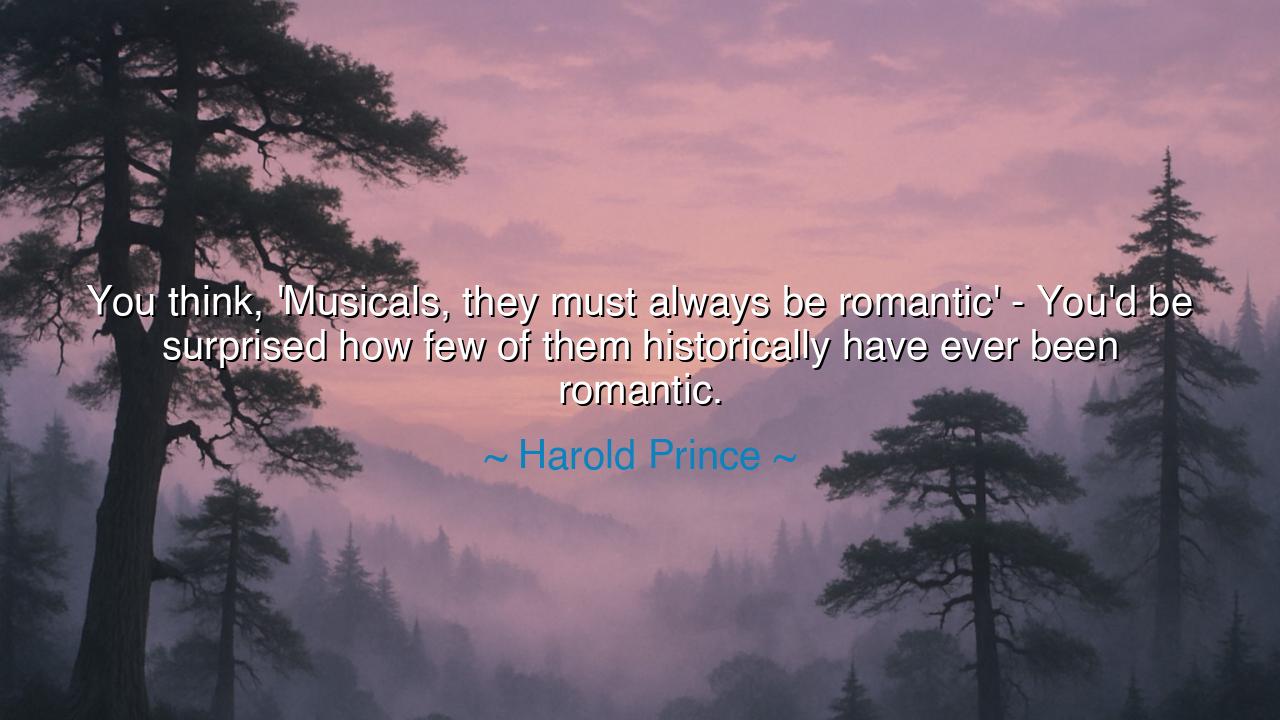
You think, 'Musicals, they must always be romantic' - You'd be
You think, 'Musicals, they must always be romantic' - You'd be surprised how few of them historically have ever been romantic.






The words of Harold Prince—“You think, ‘Musicals, they must always be romantic’—You’d be surprised how few of them historically have ever been romantic.”—strike against an assumption long held by audiences and dreamers alike. To many, the word musical conjures visions of sweeping gestures, glittering ballads, and couples whose voices soar together in love. Yet Prince, master of the stage, reveals the deeper truth: that the history of the musical is not defined by romance alone, but by struggle, satire, politics, tragedy, and the fullness of human life. In this simple phrase, he pulls aside the curtain of illusion and shows us that art is far richer than the narrow box of expectation.
At its core, this statement calls us to question the myth of romance as the foundation of every great story. Yes, romance has often been used to draw audiences, for it touches the heart quickly and directly. But Prince reminds us that in the lineage of the stage—from early operettas to Broadway’s golden age to modern innovations—romance has rarely been the true center. Instead, musicals have reflected society: they have exposed corruption, celebrated communities, mourned injustice, and lifted voices of hope and despair. To reduce them to mere vehicles of love stories is to miss the broader purpose of the art form.
History confirms this truth. Consider West Side Story, which Prince himself helped bring to life. Though it contains one of the most famous love stories in the canon, the musical is not primarily about romance. It is about tribal conflict, prejudice, and the futility of hate. The love between Tony and Maria burns brightly, yes, but only as a lens through which the audience sees the darker forces of division. Or look to Cabaret, another Prince masterpiece. Here, the show dazzles with music, yet it is not romance that drives it, but the rise of fascism and the collapse of freedom in pre-war Berlin. These works prove Prince’s point: the musical is not bound to romance but to the complexity of the human condition.
Even earlier works illustrate this. Show Boat, one of Broadway’s great innovations, dealt with racism and broken families. Porgy and Bess, though filled with soaring songs of love, centers on poverty, violence, and survival in Catfish Row. These stories may contain touches of romance, but their heartbeats are not romantic—they are tragic, political, social. Prince’s observation reveals that what we so often remember as “romantic musicals” were, in truth, stories of life’s struggles clothed in song.
The meaning of his words is profound: art should not be confined by expectation. When audiences believe musicals must always be “romantic,” they reduce them to shallow entertainment, missing their prophetic power. Prince, a visionary director and producer, devoted his life to proving that musicals could challenge, disturb, and transform. He reminds us that the stage is not merely a place for lovers to sing, but a mirror of society, where every joy and sorrow of humanity can be revealed through music and story.
The lesson is this: beware of assumptions. Do not assume art is bound to a single theme, nor that life itself must follow a single narrative. Romance is precious, but it is not all. We must learn to embrace stories that unsettle as well as those that soothe, to value truth as much as beauty. To expect only love songs from the stage is to silence the chorus of voices that cry out for justice, remembrance, and meaning.
Practically, this means entering art—and life—with open eyes. When you watch a musical, or read a story, or listen to a song, ask not only, Where is the romance? but What truth is being revealed? In your own life, do not measure meaning only by moments of passion, but also by the struggles and lessons that shape your journey. Like Prince, seek the depth behind the glitter, the reality behind the illusion.
Thus, Harold Prince’s words endure as both a critique and a call. Musicals are not bound to romance, nor is life itself. Romance may charm us, but truth transforms us. Let us then be surprised, as he urges, and in our surprise find wisdom: that the beauty of art lies not in one note, but in the symphony of all human experience.






AAdministratorAdministrator
Welcome, honored guests. Please leave a comment, we will respond soon